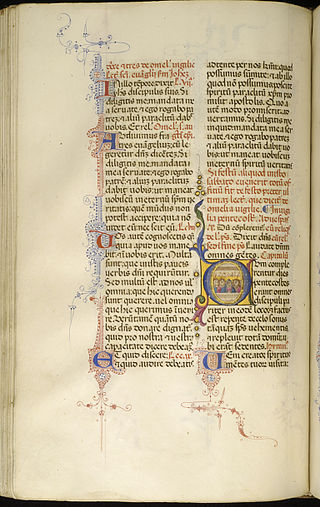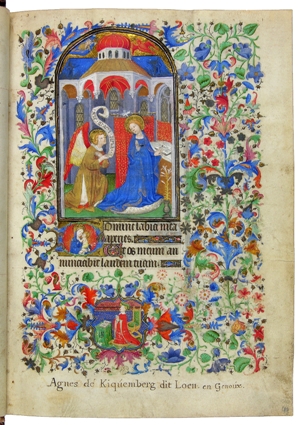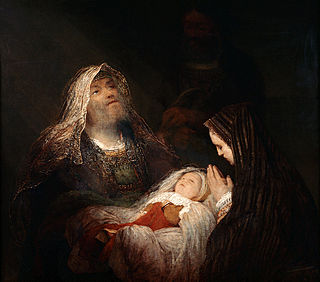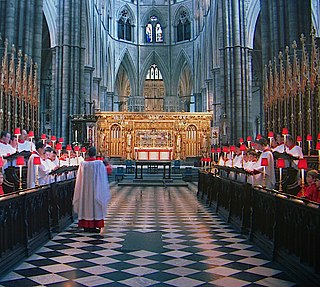Related Research Articles

The Roman Breviary is a breviary of the Roman Rite in the Catholic Church. A liturgical book, it contains public or canonical prayers, hymns, the Psalms, readings, and notations for everyday use, especially by bishops, priests, and deacons in the Divine Office.

Vespers is a liturgy of evening prayer, one of the canonical hours in Catholic, Eastern Orthodox, Oriental Orthodox, and Lutheran liturgies. The word for this fixed prayer time comes from the Latin vesper, meaning "evening".

In the practice of Christianity, canonical hours mark the divisions of the day in terms of fixed times of prayer at regular intervals. A book of hours, chiefly a breviary, normally contains a version of, or selection from, such prayers.

Compline, also known as Complin, Night Prayer, or the Prayers at the End of the Day, is the final prayer liturgy of the day in the Christian tradition of canonical hours, which are prayed at fixed prayer times.

The Nunc dimittis, also known as the Song of Simeon or the Canticle of Simeon, is a canticle taken from the second chapter of the Gospel of Luke, verses 29 through 32. Its Latin name comes from its incipit, the opening words, of the Vulgate translation of the passage, meaning "Now you let depart". Since the 4th century it has been used in Christian services of evening worship such as Compline, Vespers, and Evensong.
Matins is a canonical hour in Christian liturgy, originally sung during the darkness of early morning.

Christian liturgy is a pattern for worship used by a Christian congregation or denomination on a regular basis. The term liturgy comes from Greek and means "public work". Within Christianity, liturgies descending from the same region, denomination, or culture are described as ritual families.

The Liturgy of the Hours or Divine Office or Opus Dei are a set of Catholic prayers comprising the canonical hours, often also referred to as the breviary, of the Latin Church. The Liturgy of the Hours forms the official set of prayers "marking the hours of each day and sanctifying the day with prayer." The term "Liturgy of the Hours" has been retroactively applied to the practices of saying the canonical hours in both the Christian East and West–particularly within the Latin liturgical rites–prior to the Second Vatican Council, and is the official term for the canonical hours promulgated for usage by the Latin Church in 1971. Before 1971, the official form for the Latin Church was the Breviarium Romanum, first published in 1568 with major editions through 1962.

The Office of the Dead or Office for the Dead is a prayer cycle of the Canonical Hours in the Catholic Church, Anglican Church and Lutheran Church, said for the repose of the soul of a decedent. It is the proper reading on All Souls' Day for all departed souls (Purgatory), and can be a votive office on other days when said for a particular decedent. The work is composed of different psalms, scripture, prayers and other parts, divided into The Office of Readings, Lauds, Daytime Prayer, Vespers and Compline.

An antiphonary or antiphonal is one of the liturgical books intended for use in choro, and originally characterized, as its name implies, by the assignment to it principally of the antiphons used in various parts of the Latin liturgical rites.
The Use of York or York Rite was a liturgical use of the Roman Rite – itself a Latin liturgical rite – practised in part of northern England, prior to the reign of Henry VIII. During Henry's reign the Use of York was suppressed in favour of the Use of Sarum, developed at Salisbury Cathedral, followed by the Book of Common Prayer. "Use" denotes the special liturgical customs which prevailed in a particular diocese or group of dioceses; it is one of the medieval English uses, together with the Use of Sarum, the Use of Hereford, and the Use of Bangor.

Vespers is the evening prayer service in the liturgies of the canonical hours. The word comes from the Greek εσπερινός and its Latin equivalent vesper, meaning "evening." In Lutheranism the traditional form has varied widely with time and place. Martin Luther, in his German Mass and Order of Divine Service (1526') recommended reading the gospel in Latin in schools: "Then let another boy read the same chapter in German for practice, and in case any layman were there to hear...In the same way at Vespers, let them sing the Vesper Psalms as sung hitherto, in Latin, with an antiphon; then a hymn, as there is opportunity." While Latin vespers continued to be said in large churches, many experiments with simplified liturgies were made, including combining the hours of vespers and compline, later taken up in Thomas Cranmer's Anglican evensong. Under the influence of the 20th century Liturgical movement the Alpirsbach circle reintroduced Gregorian chant and spawned the Evangelisch-Lutherische Gebetsbruderschaft, established in 1954, which publishes the Breviarium Lipsiensae or Leipzig Breviary.

Te lucis ante terminum is an old Latin hymn in long metre. It is the hymn at Compline in the Roman Breviary.
'Vouchsafe, O Lord are the initial words of a prayer from the Matins and Vespers service of the Eastern Orthodox, and the former Prime and Compline of the Roman and Eastern Catholic Churches, and for Matins and Vespers of the Anglican, Lutheran, and other liturgical Protestant churches.

Evensong is a church service traditionally held near sunset focused on singing psalms and other biblical canticles. It is loosely based on the canonical hours of vespers and compline. Old English speakers translated the Latin word vesperas as æfensang, which became 'evensong' in modern English. Typically used in reference to the Anglican daily office's evening liturgy, it can also refer to the pre-Reformation form of vespers or services of evening prayer from other denominations, particularly within the Anglican Use of the Catholic Church.

A breviary is a liturgical book used in Christianity for praying the canonical hours, usually recited at seven fixed prayer times.

The Daily Office in Anglican churches focuses the traditional canonical hours on daily services of Morning Prayer and Evening Prayer, usually following the Book of Common Prayer. As in other Christian traditions, either clergy or laity can lead the daily office. Most Anglican clergy are required to pray Morning and Evening Prayer daily.
The Plainsong and Medieval Music Society (PMMS), also spelled as the Plainsong and Mediæval Music Society, is an English music society. Founded in 1888, the PMMS primarily researches, promotes and produces publications on medieval music, particularly the liturgical chant from that time to the present. A registered charity since 1987, it has been particularly influential in encouraging the revival of Anglican chant. Musicologists associated with the PMMS include H. B. Briggs, Anselm Hughes, G. H. Palmer, and George Ratcliffe Woodward, and more recently Gustave Reese, D. H. Turner, John Stevens, Christopher Page and Margaret Bent.
Audi benigne Conditor is a Latin hymn used during Lent attributed to Gregory the Great, who reigned as pope from the year 590 until the year 604.
John David Chambers, (1805–1893) was an English legal and liturgical writer.
References
- ↑ Modern translation - Page 77 Ernest Stuart Bates - 1936 - G. H. Palmer. The latter made it the main concern of the latter part of a long life to anglicize the Latin words of the medieval English liturgy so that they should harmonize as faithfully with the original accompaniment of 'plain-chant' as did the Latin. He combined qualifications rarely found in unison: a scholar's gift for research, a poet's sense of words, a musician's knowledge of music, and a sense of perfection entirely his own. His Salisbury 'Diurnal' is, in consequence, not only a model ...
- ↑ Worship: A Review Devoted to the Liturgical Apostolate 1952. Another office book used by a limited number of sisterhoods is The Salisbury Diurnal, edited by Dr. G. H. Palmer, the plainchant authority, and published by the Community of St Mary the Virgin, Wantage.